top of page
Our Intent:
(i) To develop all pupils into effective readers through engaging with high quality and diverse texts across the curriculum
(ii) To develop all pupils’ reading fluency and automaticity
(iii) To promote reading for pleasure
How do we identify our pupils' reading needs?*
Step 1 - During the MECA Induction process, the reading ages of all new pupils are assessed as well as their knowledge of
phonological sounds. All class teachers and learning support assistants support pupil reading development through Quality
First Teaching.
Step 2 - If a pupil's reading age is 3+ years behind their chronological age and they have gaps in their Phonological Sound
knowledge, they begin the Phonics intervention session. If a pupil's reading age is 3+ years behind their chronological age and
they have good Phonological Sound knowledge, they begin the Prosody (Reading For Fluency) intervention.
Step 3 - All pupils at MECA are supported in developing and consolidating their phonological sound knowledge and practising
their reading for fluency through whole school literacy initiatives which ensures the profile of
reading remains elevated across the school.
*Click here to view The MECA Reading Intervention Process Detailed Version - Flow Chart

Mr Dave Harvey
Teacher of Reading
ThePhonics Intervention Sessions
- Pupils who need support learning their phonics begin the Read Write Inc Fresh Start Intervention Programme
- Sessions are taught on a 1:1 basis with a member of specialist staff trained in the Fresh Start programme either in the Centre or in the libraries with sessions lasting for 20 minutes and taking place 3 - 4 times a week
- Teaching begins with the sounds that the pupil doesn't know; once it is learned, a new sound is introduced and the previously learned sounds are regularly reviewed in the following sessions
- Progress is recorded through the number of new sounds learned; termly reading age assessments and the acquisition of essential reading skills
- Once the pupil has learned all of the unknown sounds, they move on to the Prosody (Reading for Fluency) intervention

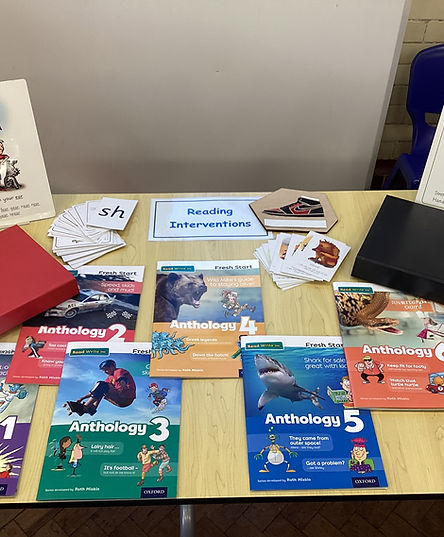
The Prosody (Reading For Fluency) Sessions
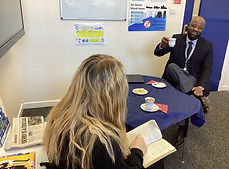
.jpg)
- Pupils who know their phonological sounds but need support with the fluency of their reading begin the Prosody Intervention Programme which focuses on tone, expression, pauses and pitch to help them understand what they are reading
- Sessions are taught on a 1:1 basis with a specialist trained in the programme and take the form of 3 sessions a week
- The first session involves the pupils mirroring the member of staff who models how to read the text; the second session involves the pupil practising reading the text aloud; the third session involves the pupils understanding, comprehending and discussing the text
- To encourage pupils with their reading, pupils can invite a member of staff of their choice to listen to them read whilst enjoying a cup of hot chocolate and a biscuit
- Progress is recorded through termly assessment of reading ages for comprehension
Supporting Pupils With Significant Literacy Difficulties
.png)
.png)
At MECA, pupils with significant literacy difficulties such as dyslexia
have access to the following support:
- coloured overlays and reading rulers
- dyslexia friendly text editions
- reading age and chronological age appropriate texts
- different coloured lined paper to write on
- the option to use a laptop and therefore the ability to tint the screen as well as
change the font and colour to suit
- a reading pen
- handwriting pens
Teachers regularly revisit key concepts within lessons to check understanding and embed knowledge in pupil long term memory.
Teaching strategies include the chunking of tasks, brain breaks, movement breaks, explicit instructions, scaffolding, modelling, extra time and using pictures as stimuli as well as a range of other specialist strategies.
An Access Arrangement Assessor visits the school to formally assess pupils to determine if they qualify for extra provision to be put into place for any examinations.
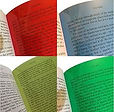



Click here to read these members of staff's experiences of living with dyslexia and the tips they suggest:
Teacher A
Teacher B
Teacher C
Teacher D


Reading Across The Curriculum
- All staff at MECA are committed to the belief that we are all "teachers of reading". Reading is promoted in lessons in every subject across the curriculum and subject specific Reading Log
Department Challenge pages record pupil achievement in each area
- All staff are aware of pupil reading ages and have received training in the area of phonics with weekly phonics 'Sound Spotter Challenges' taking place across the curriculum
- Every classroom has a mini classroom library stocked with texts to help support pupils access the current schemes of work being studied and to encourage wider, independent reading
- When staff read aloud in class, they are encouraged to model pace and expression to aid pupils in reading with fluency
- Staff help pupils with their reading of a new, unknown word through breaking down the word into the sounds and then adding them together to say the word
- Staff help pupils with their spelling by sounding out the word and encouraging pupils to write down the sounds to build the word
- Reading is promoted and encouraged through a weekly DEAR (Drop Everything And Read) time guided reading activity held during the Monday tutortime session with the focus ranging across different topics to help develop not only reading skills but develop cultural capital and British Values too

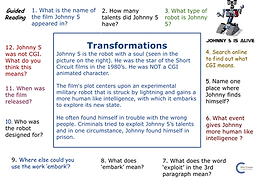

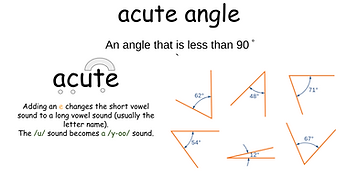
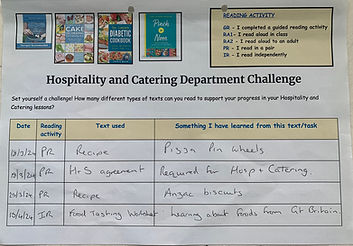

Reading For Pleasure
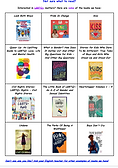

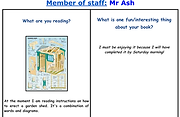

- All staff at MECA are committed to encouraging pupils to read for pleasure
- A well stocked Library has been developed in Room 3 with a diverse range of fiction and non fiction texts aimed to
cater for all interests. Pupils are encouraged to speak to us if there is anything they would like to see added
- Pupils are encouraged to use different types of texts such as graphic novels, ebooks, audiobooks and podcasts to encourage an enjoyment of reading
- Discussions are encouraged between pupils and staff through the wearing of the 'Ask me what I'm reading' badge and the ongoing staff displays of 'What Am I Reading?' posters
- World Book Day is celebrated every year with pupils and staff encouraged to dress up as a literary character amd participate in the range of activities organised
- Competitions such as 'Design a Bookmark' are held and 'Reading Certificates' are awarded to encourage pupil engagement and progress


Click here for the World Book Day website



How You Can Support Your Child With Their Reading
- Read daily with your child . Try looking at different types of text to remind them that reading happens everyday, for example menus, instructions, recipes, magazines, leaflets, webpages, text messages, emails, road signs, medicine instructions and so on
- If your child cannot read a specific word, break down the word into its sounds with them and help them to put it together. Then say the whole word. Click here to access the video: Phonics: How to pronounce sounds
- If your child asks you how to spell a word, break down the word into its sounds with them and encourage them to write down the phonetical sounds to build the word
- Play online literacy games such as Wordle and Quordle. Click here for a couple of games which pupils enjoy: Text Twist and Scramble Words
- Play other literacy games such as Hangman, Boggle, Scrabble and Alphabet Challenges
- Complete activities such as wordsearches and crosswords
- Encourage your child to join the Essex Libraries service and download the BorrowBox app to access lots of ebooks and audiobooks for free
.png)
If you would like any further information or wish to speak to someone about your child's reading then please contact Mr D Harvey, Teacher of Reading on 01621 856275 or via the form below :
bottom of page
